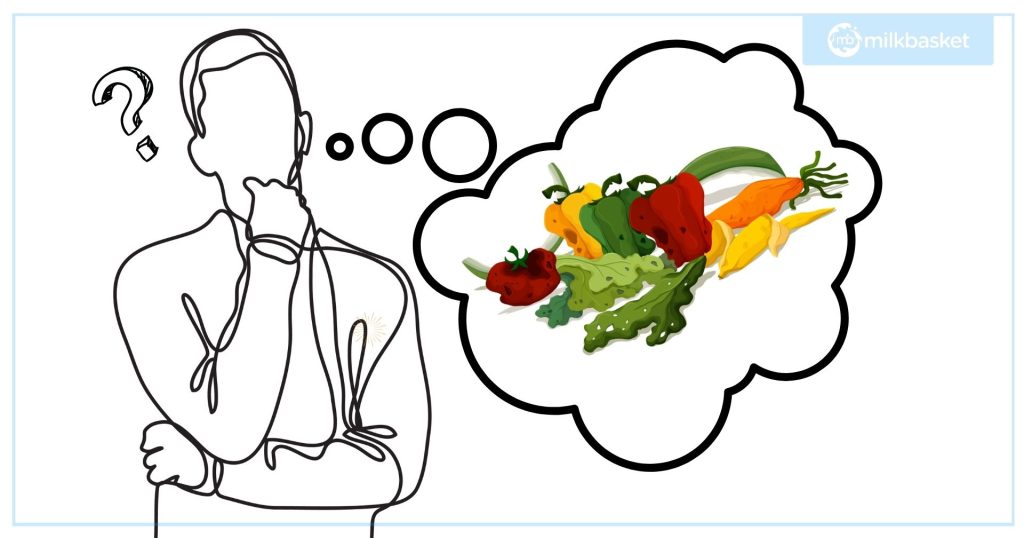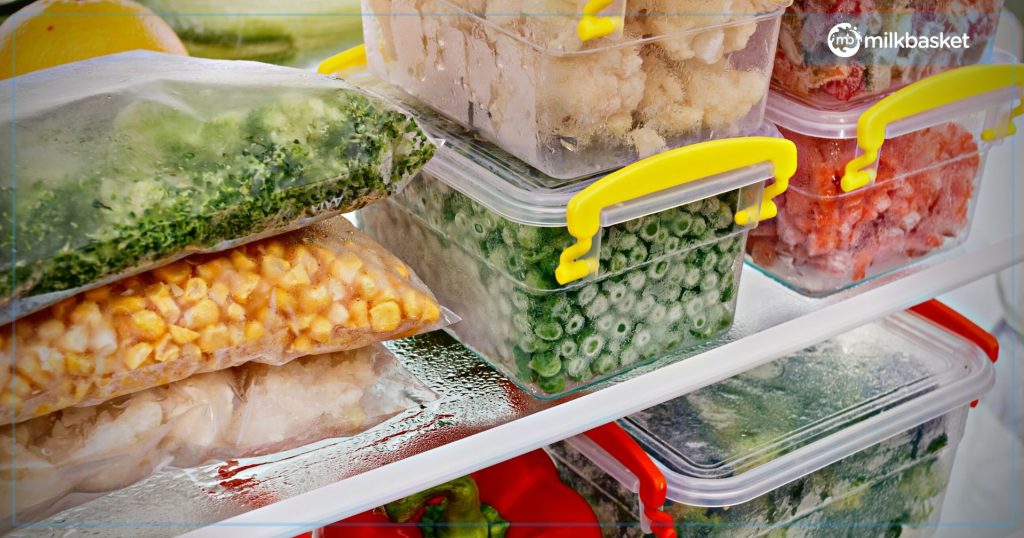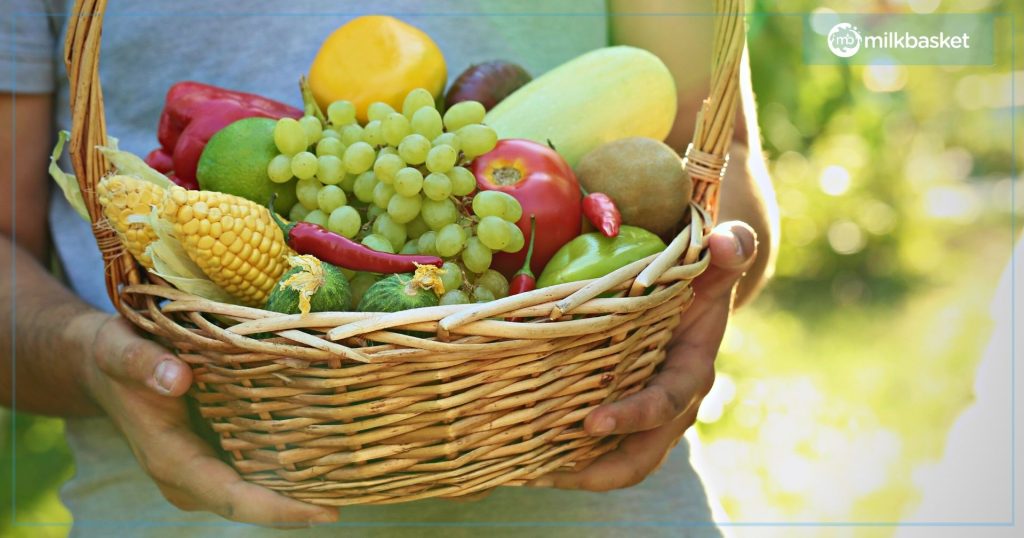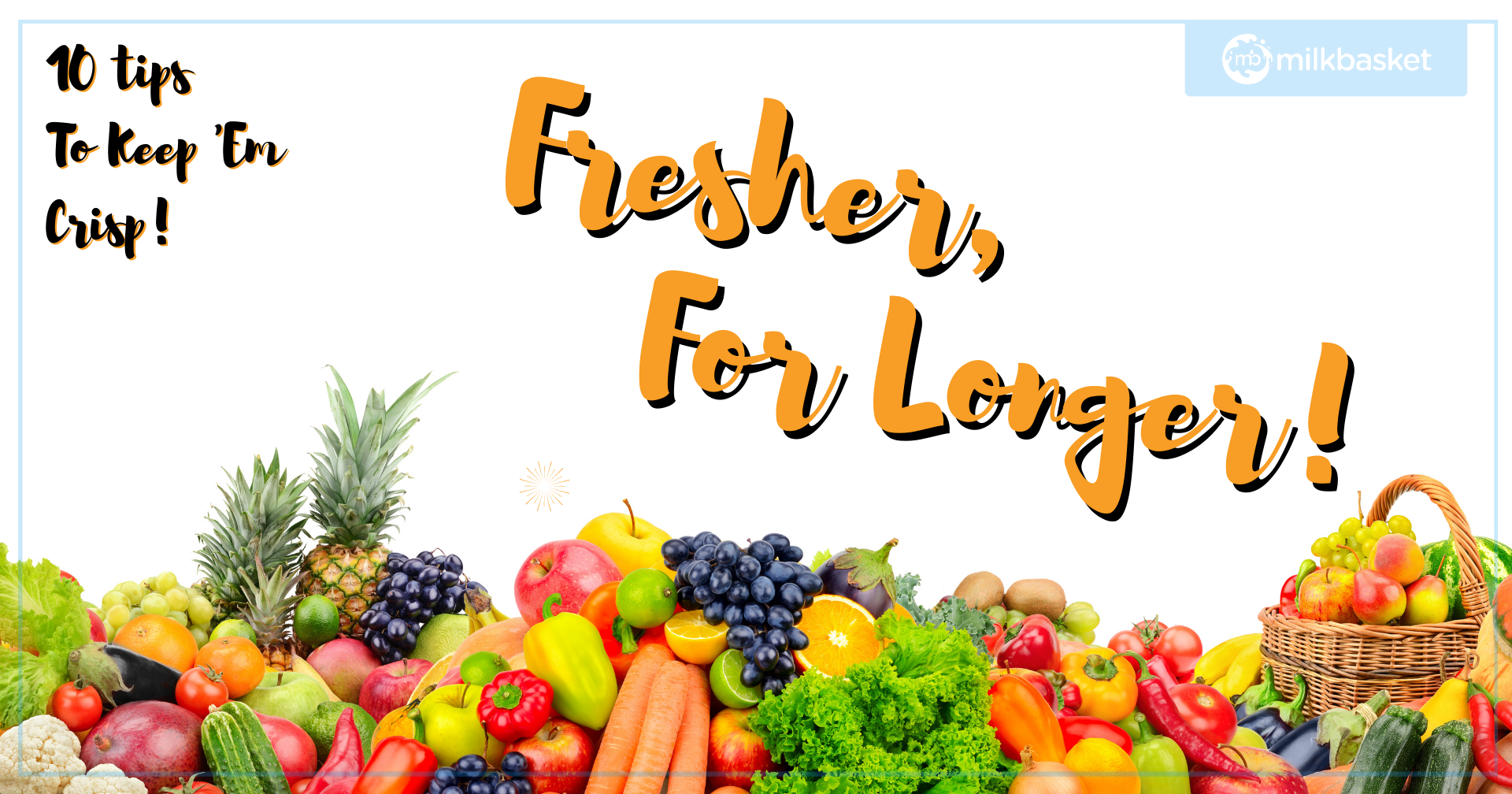10 Tips And Tricks To Keep Fruits & Vegetables Crisp & Fresh With And Without A Refrigerator!
Keeping fruits and vegetables fresh for a longer period of time can be a tricky affair. While it is not impossible to do, you definitely need professional storages and packaging methods to effectively stretch the shelf life.
Almost everyone nowadays has a refrigerator or a ‘fridge’ in their houses that do help alot to achieve this. However, there might be a possibility that you do not have a refrigerator at a moment of time due to several reasons. What do you do then? Let’s discus some tips and tricks to keep fruits and vegetables fresh, both with or without a refrigerator.
Why Do Fruits And Vegetables Rot?

We often blame the vendors for selling us the old stocked-up fruits and vegetables. However, the major contributors to the rotting of fruits and vegetables are:
- Air
- Light
- Moisture
- Temperature
- Microbial growth
Most of the food items spoil primarily because of microbial growth. Micro organisms like bacteria and molds need moisture and sugars to grow and thrive. Fruits and vegetables provide a perfect balance between these for the microbes to develop and grow.
Upon exposure of fruits and vegetables to light, their outer layers start to spoil. This process is known as photodegradation that causes discoloration, loss of flavor, vitamins, and proteins.
So we now know what needs to be stopped or atleast slowed down in order to delay the rotting process!
How To Keep Fruits & Vegetables Fresher In A Refrigerator

Maintaining the right temperature and moisture is the key to keeping fruits and vegetables fresh for a longer period of time. A refrigerator comes in handy while trying to achieve this goal. However, please note that some fruits and vegetables are best stored ta room temperature, we’ll talk about that later in the blog.
- Can It Be Refrigerated?
Some fruits and vegetables will last longer if kept cold and refrigerated, but not all. It’s important to store the following produce in the fridge: apples, pears, ginger, greens/lettuce, cabbage, broccoli, cauliflower, asparagus, roots/tubers (carrots, parsnips, turnips, beets, rutabaga, and radishes), and mushrooms. Mangoes and citrus (oranges, lemons, limes, and grapefruit) can be kept on the counter for a week or two, depending on ripeness, before needing to be refrigerated.
- Wash Them!
Before you plan to store the fruits and vegetables in the refrigerator, its always best to properly wash them with clean water and dry them with paper towels as much as possible to remove extra moisture.
- Washing ensures fruits and vegetables are physically clean and no dirt or other grime enters your refrigerator.
- It also cleans away a few of the larger microbes and debris that can become a breeding ground for the microorganisms.
- This is one crucial step that the pandemic has tought us!
- Use Air Tight Containers
Storing food in air tight containers helps keep it fresh in many different ways. Some of them are:
- Organizes the storage in the fridge
- Retains moisture
- Keeps things neat and tidy
- Traps the odour from leaking in the fridge
- Keeps the food sealed from coming into contact with the air.
- Zip Lock Them!
Zip lock air tight bags are one of the best alternative ways to safely store fruits and vegetables. While Ziploc is a brand rather than the product, you can find various other brands in India that manufacture seal tight bags that can be washed and reused.
Air tight bags are the right way to go when it comes to store fruits and vegetables in a refrigerator due to the following reasons:
- Ensure an airtight seal that preserves the freshness and moisture inside the bad
- Does not let the refrigerator dry up the fruits and vegetables
- Keeps contaminants out of the bag and away from the vegetables.
- Keeps the refrigerator free of any smell or odour coming from the food items inside the bag.
- Eco-friendly option that allows you to use it multiple times.
- Makes your storage space compact and organized.
- Freeze Them! Yes!
If you know it’s going to be a while before you’re ready to eat it, you can always freeze your produce for later. This is a great way to preserve the nutrients and flavor. For fruit, you’ll want to freeze it at peak ripeness to ensure you get the sweetest taste later. When freezing vegetables, you’ll want to blanch them to prevent freezer burn and stop the degradation of enzymes, nutrients, and flavor. To do this, boil whole or cut up pieces of the vegetable for one to two minutes and then place immediately in ice cold water. If you’d like to have a steady supply of herbs for cooking, stuff them in an ice tray with water or oil and freeze it.
How To Keep Fruits & Vegetables Fresher If You Do Not Have A Refrigerator

Well, there might be times when you wil not be able to store your fruits and vegetables in the refrigerator due to reasons unknown. Well there are a few things you can do to make sure your fruits and vegetables last longer than usual.
- Wash Green Veggies in Ice Cold Water
Ice bath is an effective way of locking the moisture in your green vegetables, cooling them down, and avoiding that wilted appearance old greens tend to take on after some time. All you need to do is wash your greens in ice-cold water to revive the moisture, followed by patting them dry with some paper towels. Now place your clean and dried fresh produce in an air-tight container.
- Tomatoes Hate The Refrigerator
Contrary to what you might have been led to believe, storing your tomatoes in the fridge will have an effect opposite to what you’re looking for. Exposure to cold temperature drains tomatoes of their natural flavour, in addition to ruining the texture of the produce. What you can do instead, is put them in a bowl lined with a paper towel, with the stems up. Store your bowl of tomatoes in room temperature, and away from any sources of heat or direct sunlight. You can also purchase special containers that come with controlled ventilation and ridges to ward off the moisture.
- Use Colanders Or Net Bags To Store Fruit
What you absolutely do not want to do is to void your fruits and vegetables of fresh air IF you are not storing them in a refrigerator. To ensure these get a lot of air, always store the fruits and veggies in a colander or net bags so that fresh air keeps passing through the items. This hels to eliminate any odour and also flushes away gases produced by some fruits that speed up the ripening process!
- Fruits that NEED to be stored at room temperature
- Apples (for up to seven days, then put them in the fridge)
- Bananas
- Grapefruit
- Lemons
- Limes
- Mandarins
- Mangoes
- Oranges
- Papayas
- Pineapple
- Watermelon
- Vegetables That Do Not Require Refrigeration
- Cucumbers
- Basil (in water)
- Onions
- Eggplant
- Garlic
- Ginger
- Peppers
- Potatoes
- Pumpkins
- Sweet potatoes
- Tomatoes
While refrigerators have surely expanded our ability to store food items to a longer period of time, it is always isn’t necessary to refrigerate everything to increase its shelf life. Try these tips to get the maximum shelf life out of your fruits and vegetables!
Eat Fresh, Eat Healthy!
Categories
Popular Posts
-

4 Eco-Friendly Decorations for Ganesh Chaturthi
Spread the loveLooking for sustainable eco Ganpati decoration ideas as Ganesh Chaturthi approaches on August 26, 2025? You’re not alone in wanting to celebrate Lord Ganesha while protecting our environment. This festival season, you can create beautiful decorations that honor tradition without harming the environment. Milkbasket understands your need for convenient online grocery delivery during […]
19 Aug 2025 read More... -

Milkbasket – A Revolution In The Online Grocery Delivery Services In India
Spread the loveThere’s no denying the fact that the pandemic has drastically changed the way people spend their time online, buying everything through various online retail platforms with the convenience of home deliveries in India. Milkbasket, with it’s features has proven to be a revolution in the online grocery delivery services in India. While stepping […]
08 Jul 2022 read More... -

Milkbasket’s Latest DVC Campaign Is Out, And It’s Quirky And Relatable As Heck!
Spread the loveThe year 2021 was all about patience, resilience, and the grind it takes to get back up from a worldwide slump that the COVID-19 pandemic had hit us with. It made us all revisit our roots, recalibrate our priorities, and strengthen our foundations. With the better part of 2022 gone into slowly spreading […]
28 Sep 2022 read More... -

Nabhi Chikitsa or Belly Button Therapy: The Simple Health Secret You NEED To Know!
Spread the loveOur Navel or Belly Button (scientific name Umbilicus) is believed to be the centre of our life force. Most of us take it as just another part of our body not knowing its deep, thrilling world. In ancient Hindu healing practices, the Navel is considered to be the most important point of the […]
08 Sep 2022 read More...





